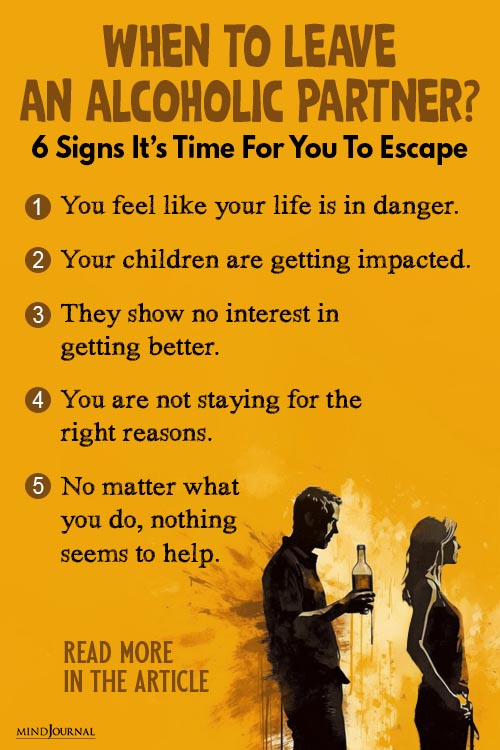Love can be a powerful force that binds two souls together, but there are moments when you must summon the courage to let go. If you’ve found yourself in a relationship with an alcoholic partner, you understand the rollercoaster of emotions and uncertainties that come with it. So, when to leave an alcoholic partner?
It’s not an easy decision to make, but sometimes leaving becomes a necessary step towards healing and finding your own happiness. In this article, we’ll explore seven tell-tale signs that indicate it may be time for you to break free from living with an alcoholic.
So, grab a seat, take a deep breath, and let’s navigate this challenging terrain together.
Related: 7 Indicators You Are Dating An Alcoholic
When To Leave An Alcoholic Partner? 6 Warning Signs You Need To Escape
1. You feel like your life is in danger.
Domestic violence and aggression are just some of the dangerous side effects of living with an alcoholic. One moment your partner is being loving and caring towards you, and the very next moment you’re the person they hate the most; alcohol has the power to cause this shift.
It doesn’t matter if the violent outbursts involve being physically abusive towards you or vandalising your home, it’s no longer safe for you to live with them under the same roof.
If you always feel unsafe and fear for your and your children’s safety whenever your partner drinks, it’s time to leave them for good.
2. Your children are getting impacted.
When to leave an alcoholic partner? It is already hard enough living with an alcoholic, but having children together just takes it up a notch.
Being a parent, it’s natural to put your children first, and one of the most concerning things is that children who grow up with alcoholic parents, are more likely to become alcoholics later. Also children who live with alcoholic parents tend to develop emotional and behavioral problems too.
Depression and anxiety are common amongst children of alcoholics as well as self-esteem issues. If you have noticed some of these behaviors in your kids, it is time to go.

3. They show no interest in getting better.
So many times, alcoholics don’t realize how far gone they are, no matter how much you may try to make them see the truth. If you see that your partner is refusing to seek treatment for their alcohol abuse, and every request of yours is ridiculed or dismissed, then you need to rethink everything.
Spending your whole life with an alcoholic and expecting to have a normal relationship with them will never happen. Their refusal to compromise and putting their drinking first has exhausted and broken you.
Remember that you can’t help those who don’t want to help themselves, so it’s better for you to take your kids and leave them to handle life on their own.
4. You are not staying for the right reasons.
For any relationship to work out in the long run, there must be trust, mutual respect, forgiveness and love between two people. But when you’re living with an alcoholic, chances are all these things are missing.
The harsh truth is, love is not enough to make a relationship or marriage work; you need all of these above to ensure you have a healthy relationship. If you fear that your spouse will destroy their life and hit rock bottom if you’re not there to help them – that’s also not the right reason to stay.
If you are staying back because you don’t want to hurt them, you are simply sacrificing yourself at the altar.
Related: 10 Signs that Your Childhood with an Alcoholic Parent Is Still Affecting You Today
5. No matter what you do, nothing seems to help.
If you are wondering when to leave an alcoholic partner, then this is the sign to look for.
There are many alcoholic people out there who realize what they are doing and how their drinking is impacting their loved ones, and they’re willing to change their ways for the better. Unfortunately, that’s just a small portion of people.
Many alcoholics, despite knowing the repercussions choose to continue drinking like the world’s about to end, and their issues get to a point where there’s no coming back. You give your all trying to help them, but nothing seems to work.
When you feel that nothing’s ever going to change and no amount of emotional support can help them, that’s when you know you have to leave for good.
6. Your mental and physical health is deteriorating.
More often than not, as their partner you bear the brunt of their alcoholism, and you are the one who always has to pick up the pieces. You feel like you’re always in a lose-lose situation with no light at the end of the tunnel.
Your partner might have lost their job due to alcoholism, or maybe your finances have taken a hit due to their excessive drinking. It’s on you to take care of everything in the house and bear the financial burden to make ends meet, which takes a heavy toll on your mentally and psychologically.
Your physical health also starts to suffer due to the constant stress and fear you have to live with. Everything starts to pile up gradually and pushes you to a mental breakdown. Living with an alcoholic can be very draining, which is why you need to leave.
Now that we know when to leave an alcoholic partner, let’s talk about how to leave an alcoholic partner. These tips can be an enormous help for someone living with an alcoholic, including you.

How To Leave An Alcoholic Partner?
- Educate yourself about addiction: Try to understand what alcoholism is, how addiction works, and how it impacts relationships so that you can prepare yourself emotionally and mentally.
- Seek help and support from your loved ones: Share your troubles with your close ones, so that they can emotionally support and guide you through this painful process.
- Come up with a safety plan: How to leave an alcoholic partner? Create a plan so that your physical and emotional safety is ensured when you choose to leave, including finding a safe place to stay with your kids.
- Explore and be aware of your legal options: Speak to a lawyer about your rights, and try to know more about divorce and custody proceedings if you have children.
- Empower yourself: Focus on improving your self-esteem and self-confidence through self-reflection, therapy and participating in activities that make you feel strong and sure of yourself.
- Make sure your finances are in order: Look at your financial situation, create a budget and focus on being financially independent, so that you can be stable after your leave.
- Keep a record of everything: This can be a huge help for someone living with an alcoholic. Keep a record of every alcohol-related incident such as violence, arguments, neglect and whatever you have that can serve as evidence of the abuse you were living with.
- Seek professional help: Consult a therapist, or support group who specialize in addiction to know how you can handle such a situation and take care of yourself.
- Develop an exit strategy: If you’re wondering how to leave an alcoholic partner, then strategically plan the logistics of leaving, such as packing essential belongings discreetly and arranging transportation.
- Stay strong during challenging moments: Understand that leaving can be emotionally challenging, and remind yourself of your worth, the reasons for leaving, and the better future that awaits you.
- Follow through with your decision: Once you’ve made the decision to leave, commit to it and stay determined, even when faced with potential setbacks or doubts.
Related: 3 Reasons Why Alcohol Affects Your Relationship And What To Do About It
Bottomline
When you realize when to leave an alcoholic partner for good, that’s when you take back control of your life, and take the first step towards living a happy, safe and meaningful life.
Choosing to leave an alcoholic partner take a lot of courage, and you are so strong for finally taking this step. Remember to prioritize your well-being, seek support, and stay strong as you embark on this journey of healing and growth.











Leave a Reply